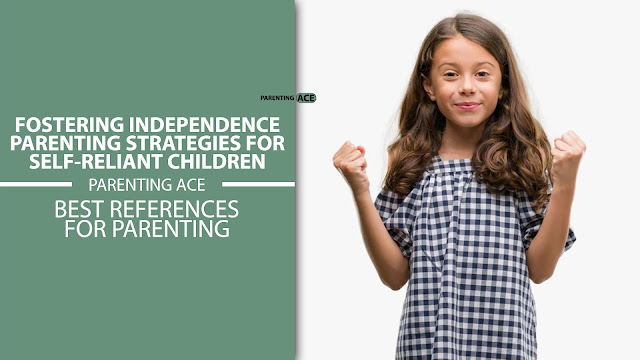Fostering Independence: Strategies for Parents to Nurture Self-Reliance in Children
As parents, fostering independence in our children is not only a profound responsibility but also a gift we can give them for life. In this blog post, we embark on a journey to explore effective strategies and insights aimed at promoting self-reliance in our children. From encouraging decision-making and problem-solving skills to striking a balance between guidance and freedom, join us as we delve into the art of empowering our children to navigate life's challenges with confidence and resilience.
 |
| Fostering Independence: Parenting Strategies for Self-Reliant Children |
How Do Parents Promote Independence In Their Children?
Encouraging independence in children is a vital aspect of parenting that lays the groundwork for their future success and well-being. Parents play a crucial role in fostering autonomy and self-reliance in their children, guiding them towards becoming capable and confident individuals. In this article, we explore effective strategies that parents can employ to promote independence in their children, drawing from insights rooted in developmental psychology and counseling expertise.
Fostering Independence Through Encouragement and Support
One of the fundamental ways parents can promote independence in their children is by providing encouragement and support. By offering praise and recognition for their children's achievements, efforts, and attempts at autonomy, parents reinforce a sense of self-efficacy and competence. Moreover, creating a supportive environment where children feel safe to explore, make mistakes, and learn from failures is essential. This nurturing atmosphere builds resilience and fosters a growth mindset, encouraging children to take on challenges and strive for self-improvement.
Encouraging Decision-Making and Problem-Solving Skills
Empowering children to make decisions and solve problems independently is key to developing their autonomy. Parents can facilitate this process by involving children in decision-making from an early age, offering them choices within reasonable limits, and respecting their preferences and opinions. Additionally, parents can encourage critical thinking and problem-solving skills by engaging children in discussions about various topics, encouraging them to brainstorm solutions to challenges, and providing opportunities for them to implement their ideas. By gradually increasing the complexity of decision-making tasks as children grow older, parents can help them develop confidence in their abilities to navigate life's complexities independently.
Balancing Guidance with Freedom
Finding the balance between providing guidance and allowing freedom is essential in promoting independence in children. While parents need to offer structure, rules, and boundaries to ensure their children's safety and well-being, they should also allow for autonomy and self-directed exploration. Providing opportunities for children to take on age-appropriate responsibilities, such as chores, managing personal belongings, or planning their schedules, helps build self-discipline and accountability. Additionally, giving children the freedom to pursue their interests, hobbies, and passions allows them to develop a sense of identity and purpose.
Cultivating Self-Regulation and Emotional Resilience
Teaching children self-regulation skills and emotional resilience is crucial for fostering independence. Parents can help children learn to manage their emotions, cope with stress, and regulate their behavior by modeling healthy coping strategies and providing guidance in challenging situations. Teaching children mindfulness techniques, relaxation exercises, and problem-solving strategies equips them with valuable tools to navigate life's ups and downs independently. Moreover, encouraging children to express their feelings, seek support when needed, and learn from setbacks fosters emotional intelligence and resilience, empowering them to face life's challenges with confidence.
In conclusion, promoting independence in children is a multifaceted process that requires patience, consistency, and a nurturing approach from parents. By fostering a supportive environment, encouraging decision-making and problem-solving skills, balancing guidance with freedom, and cultivating self-regulation and emotional resilience, parents can empower their children to become self-reliant and confident individuals. Ultimately, the goal of parenting is to equip children with the skills and mindset necessary to navigate the complexities of life independently, setting them on a path towards success and fulfillment.




